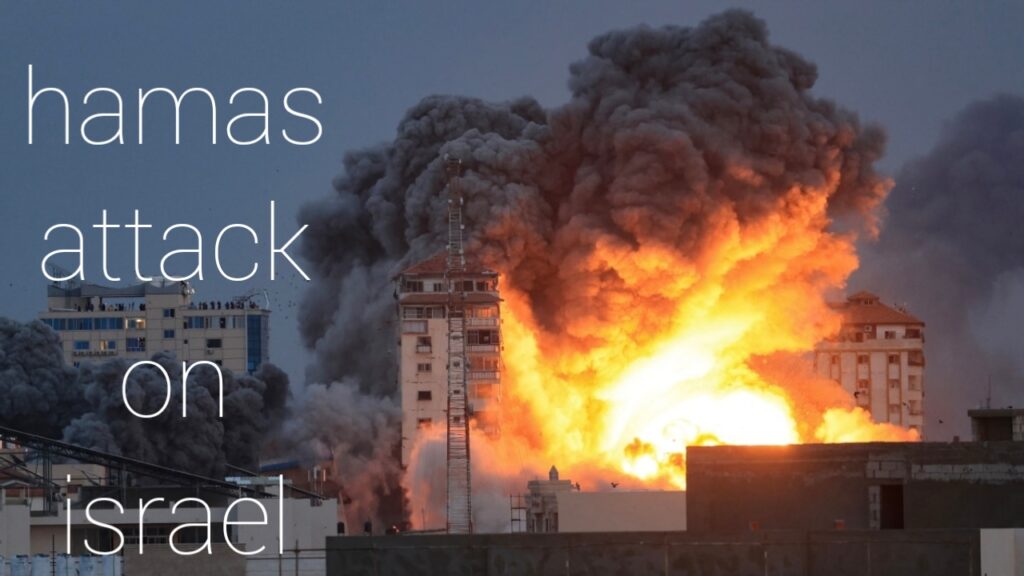In a dramatic escalation in the Middle East, Hamas launched a surprise attack on Israel precisely when Israeli Prime Minister Benjamin Netanyahu was on an official visit to the United States, meeting former President Donald Trump. This sudden and strategic move by Hamas not only caught Israel’s defense forces off guard but also sent shockwaves through international diplomatic circles. As the conflict unfolds, many are asking: What will be the impact of this attack? How will the United States respond, especially with Netanyahu on American soil?

The Attack: What Happened?
According to initial reports, Hamas fired multiple rockets into Israeli territory from the Gaza Strip. The Iron Dome defense system intercepted several rockets, but some still managed to hit residential areas, causing damage and panic among civilians. Air-raid sirens blared across Israeli cities, and citizens were forced to take shelter.
Simultaneously, there were reports of infiltration attempts by Hamas militants into Israeli border areas, leading to fierce gunfights between Israeli forces and the attackers. The Israeli Defense Forces (IDF) quickly launched retaliatory airstrikes targeting Hamas strongholds in Gaza.
This assault came at a particularly delicate time—just as Netanyahu was holding high-profile meetings in the U.S. to bolster Israel’s global alliances and security posture.
—
Why the Timing Matters
The timing of the attack is being seen as a calculated message. Netanyahu’s visit to the U.S., and especially his meeting with Donald Trump—a known supporter of Israel—was expected to reignite strong bilateral ties. It was also an opportunity for Netanyahu to gain international backing amid rising tensions in the region.
By attacking during this visit, Hamas aimed to send a strong geopolitical message, undermining Netanyahu’s diplomatic mission and questioning Israel’s security assurances, even when its top leader is overseas.
—
Trump and Netanyahu Meeting: Key Focus Areas
The meeting between Trump and Netanyahu was widely covered in international media. The two leaders reportedly discussed issues including:
The Iran nuclear threat
Strengthening Israel-U.S. defense ties
The future of Israeli-Palestinian relations
The rising influence of militant groups in the region
It is likely that the Hamas attack will now overshadow these discussions, making the Israel-Gaza conflict a primary issue of concern.
—
Potential Impact on Israel
The immediate impact on Israel has been a rise in public anxiety and a renewed focus on internal security. Netanyahu, who was expected to return to Israel after concluding his meetings, may expedite his visit and call for an emergency national security meeting upon arrival.
Militarily, Israel may respond with a broader counter-offensive in Gaza, potentially involving ground troops if the situation escalates further. Domestically, this attack may also strengthen support for Netanyahu’s hardline stance against Hamas and other militant groups.
—
How Will the U.S. Respond?
Although Joe Biden is the current U.S. President, Netanyahu’s meeting with Trump signifies the importance of bipartisan support for Israel in American politics. The U.S. has historically backed Israel’s right to defend itself against such attacks.
Expectations are that the U.S. government will:
Publicly condemn the Hamas attack
Reaffirm its support for Israel’s security
Possibly work with allies in the UN to discourage further escalation
While the Biden administration might not intervene militarily, it will likely intensify diplomatic pressure on Hamas and its backers to cease hostilities.
—
Wider Geopolitical Implications
This incident also raises concerns for the broader Middle East. Here’s what could unfold:
Iran, a known supporter of Hamas, could be drawn into wider scrutiny and condemnation.
Arab nations that have recently normalized relations with Israel (like the UAE, Bahrain, and Morocco under the Abraham Accords) may now face pressure from both domestic groups and international partners.
UN and EU may call for immediate ceasefire and initiate peace talks, although such efforts often yield little lasting success in the region.
—
Voices on the Ground
Civilians in both Israel and Gaza continue to bear the brunt of the violence. In Tel Aviv, citizens reported waking up to rocket sirens and scrambling to underground shelters. In Gaza, airstrikes have damaged infrastructure and disrupted daily life.
Human rights groups have once again called for both parties to prioritize civilian safety and adhere to international humanitarian law.
—
Conclusion: A Conflict at a Critical Crossroads
This latest escalation between Hamas and Israel, timed precisely with Netanyahu’s visit to the U.S. and meeting with Donald Trump, underscores the fragility of peace in the region. As world powers watch closely, the coming days will be critical in determining whether the situation will calm down or spiral into a larger conflict.
With both politics and military strategies at play, global attention now shifts to how Israel responds, and what role the U.S. will take in mediating or supporting its long-time ally.
